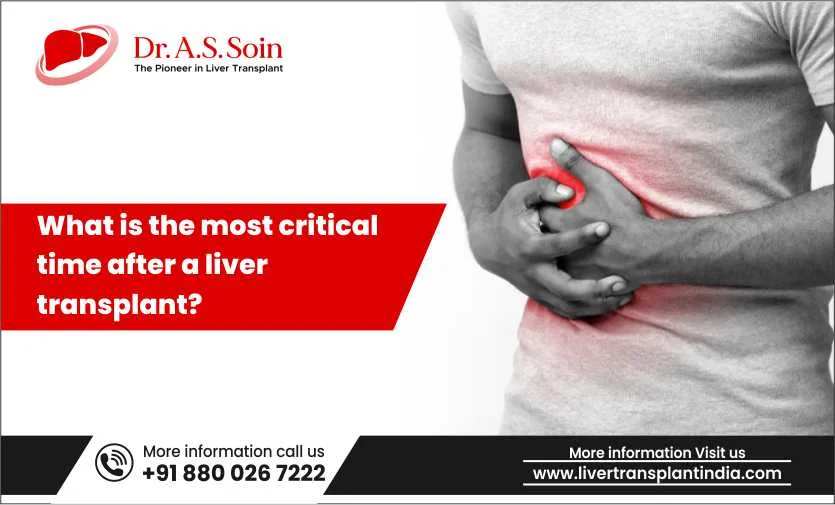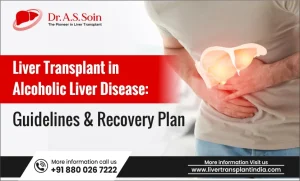Liver transplantation is a life-changing procedure that gives patients a new lease on life. But like any major surgery, the recovery process is filled with challenges and delicate moments. One of the questions patients often ask is: “What is the most critical time after a liver transplant surgery?” In this blog, we’ll explore the critical time frames after a liver transplant, potential complications, and essential care strategies to help patients and their families navigate this challenging period.
Table of Contents
ToggleThe Immediate Post-Transplant Period: The First Few Days
The immediate postoperative period refers to the first 72 hours to weeks following the liver transplant surgery. This phase is vital as the body begins to accept the new organ and heal from the surgical procedure.
Monitoring in the Intensive Care Unit (ICU)
After the surgery, patients are typically transferred to the ICU for close monitoring. During this critical period, patients may experience fluctuations in blood pressure, heart rate, and other vital signs. These changes are partly due to the body’s response to surgery and the anesthesia. In the ICU, healthcare professionals observe these vital signs, liver function, and overall stability. The length of the ICU stay depends on the patient’s condition but usually lasts a few days, allowing for careful observation and immediate intervention if necessary.
https://bzd.cfga.gov.mn/
In addition to continuous monitoring, the medical team in the ICU focuses on various essential tasks to support recovery:
Pain Management
Effective pain control is crucial, as severe pain can lead to stress responses that may affect blood flow and organ function. Strong painkillers are given initially, and doses are adjusted as the patient recovers.
Ventilation and Breathing Support
Many patients remain on a ventilator for a day or two after surgery. Early extubation (removal of the breathing tube) is a sign that the patient is stable enough to breathe on their own. However, this decision is made carefully to ensure the patient’s lungs and the new liver are not stressed.
Administration of Immunosuppressants
Almost immediately after the surgery, patients begin taking medications to prevent rejection. These drugs are critical and must be taken exactly as prescribed. Adjustments may be needed based on how the patient responds.
Fluid and Blood Management
Because liver transplantation is a major surgery, blood loss can occur. Patients might receive fluids and, in some cases, blood transfusions. The team carefully manages fluids to maintain blood pressure without overloading the body.
Potential Immediate Complications
During this period, besides pain and blood loss, several complications can arise:
- Blood Clots (Thrombosis): The formation of clots in the liver’s blood vessels can disrupt blood flow and damage the organ.
- Primary Non-Function (PNF): In rare cases, the transplanted liver fails to function immediately. This can occur due to various reasons such as poor organ quality, complications during surgery, or severe rejection.
- Infections: The surgical procedure can increase susceptibility to infections. A study highlighted that up to 80% of liver transplant recipients develop at least one infection during the first year post-transplant.
The First Week: Gradual Transition to the Transplant Ward
Once a patient is stable in the ICU, the next step is usually a transfer to a specialized transplant ward. This phase, often covering days 3 to 7, is still delicate but marks a transition from intensive care to a setting where the patient starts to engage more with the recovery process.
Key Elements of the First Week
Here’s an outline of the essential aspects that shape this initial period.
Regular Lab Tests
Daily blood tests are crucial to track the new liver’s performance. These tests measure liver enzymes, bilirubin levels, and clotting factors—all of which offer a window into how well the organ is working and whether the body is tolerating the transplant.
Physical Activity and Breathing Exercises
Early movement is encouraged to reduce the risk of blood clots and promote overall recovery. Simple exercises, such as short walks in the hospital corridor and deep breathing exercises, help prevent complications like pneumonia.
Education on Medications and Self-Care
During this time, nurses and transplant coordinators begin to educate patients and their families about the medications they’ll need to take at home. This includes the importance of strict adherence to immunosuppressants, recognizing signs of infection, and managing side effects.
Emotional Support
Recovering from a liver transplant surgery isn’t just physical—it’s emotional, too. Patients may feel anxious or overwhelmed. Hospital social workers, psychologists, or counselors are available to help manage these feelings, ensuring that the patient’s mental health is as well cared for as their physical health.
Planning for Discharge
By the end of the first week, if all goes well, the transplant team starts planning for the patient’s eventual discharge. This includes scheduling follow-up appointments, teaching self-care routines, and arranging support at home.
The First Three Months: A Critical Window
The first three months post-transplant are considered the most critical. During this time, the focus is on ensuring the transplanted liver functions correctly and monitoring for potential complications.
Risk of Acute Rejection
The immune system is programmed to attack anything it sees as “foreign.” Even with immunosuppressive medications (drugs that dampen the immune response), the body may begin to react against the new liver. This is most common within the first three months. Symptoms may include fever, jaundice, and abdominal pain. Regular blood tests and liver function tests are essential to detect and manage rejection early.
Infection Surveillance
Immunosuppressive medications, essential to prevent organ rejection, can also make patients more susceptible to infections:
- Bacterial, viral, and fungal infections
- Respiratory infections such as pneumonia
- Urinary tract infections
- Wound infections
Prophylactic antibiotics and antifungal medications are often prescribed to mitigate this risk. Additionally, patients must follow strict hygiene practices, avoid crowded places, and consume only properly cooked food to minimize the risk of infections.
Medication Management
Adherence to immunosuppressive therapy is crucial. Patients must take their medications as prescribed to prevent rejection and other complications. Regular follow-ups with the transplant team help adjust medication dosages and monitor side effects.
Why the Early Days Matter So Much
Here is how the early days require a careful balance to support recovery while minimizing risks:
The Window of Immune Vulnerability
In the first several days after a liver transplant surgery, the immune system is caught in a balancing act. On one hand, it needs to be suppressed to prevent rejection of the new liver; on the other, too much suppression can increase the risk of infections. This narrow window of immune vulnerability is why the early post-transplant period is so critical.
Rejection vs. Infection
Even with powerful medications, there is always a risk that the body might start attacking the new liver. Conversely, a heavily suppressed immune system can allow infections—often subtle at first—to take hold.
The Delicate Balance of Fluids
After major surgery, managing fluids is both an art and a science. Fluid levels must be maintained to support blood pressure and organ function, but too much fluid can lead to problems such as swelling or even pulmonary edema (fluid in the lungs). In the early hours, careful titration of fluids—and sometimes blood products—is essential to keep everything in balance.
Long-Term Considerations: Beyond Three Months
While the risk of acute complications decreases after the initial months, long-term vigilance remains essential.
Chronic Rejection
Chronic rejection can occur months or even years after the transplant. It leads to the gradual loss of liver function. Regular monitoring and early detection are vital to manage this condition effectively.
Cardiovascular Health
Post-transplant patients have an increased risk of cardiovascular diseases due to factors like hypertension, diabetes, and weight gain associated with immunosuppressive therapy. Adopting a heart-healthy lifestyle is crucial.
Cancer Surveillance
Long-term immunosuppression can increase the risk of certain cancers, including skin cancer and lymphomas. Regular screenings and preventive measures are essential components of post-transplant care.
Preparing for the Future: Life Beyond the Hospital
Once the critical early days have passed and the patient is safely at home, the recovery journey continues with regular follow-ups, lifestyle adjustments, and a focus on long-term health. Here’s how to prepare for the future:
Nutrition
A balanced diet supports liver health and aids in recovery. Patients should focus on:
- Protein: Essential for healing and muscle maintenance.
- Fruits and Vegetables: Rich in vitamins, minerals, and antioxidants.
- Whole Grains: Provide necessary fiber and nutrients.
Limiting salt, sugar, and unhealthy fats is also advisable.
Physical Activity
Engaging in regular physical activity enhances cardiovascular health, strengthens muscles, and improves mood. Patients should consult their healthcare provider to develop a suitable exercise regimen.
Avoiding Alcohol and Tobacco
Alcohol and tobacco can harm the liver and overall health. Abstaining from these substances is strongly recommended post-transplant.
Stress Management
Techniques such as meditation, counseling, and participation in support groups can improve quality of life and help patients cope with the emotional aspects of transplant recovery.
Rest and Relax
Sleep and rest should also be given priority. A regular sleep schedule and adequate rest allow the body to repair itself and reduce stress. Many patients find that establishing a routine that includes time for relaxation and hobbies is beneficial. Reading, listening https://bgd.cfga.gov.mn/ to music, or spending quiet time with family can help reduce stress and promote a positive outlook.
Staying in Touch With Your Transplant Team
Regular appointments allow your liver transplant surgeon in Delhi to:
- Monitor liver function.
- Adjust medications as needed.
- Provide guidance on diet, exercise, and overall lifestyle.
Final Thoughts: A New Life with a New Liver
A liver transplant is a second chance at life, but it comes with responsibilities. The support of your medical team, adherence to medications, and embracing a healthier lifestyle will all contribute to your long-term success.
If you or a loved one is considering or has undergone a liver transplant and you have questions about the recovery process, don’t hesitate to reach out for expert guidance. For https://dafm.stamforduniversity.edu.bd/ personalized advice and world-class care, consider scheduling a consultation with Dr. A.S. Soin, a renowned liver transplant surgeon in Delhi. With extensive experience and a compassionate approach, Dr. Soin and his team are dedicated to helping you achieve the best possible outcome.








